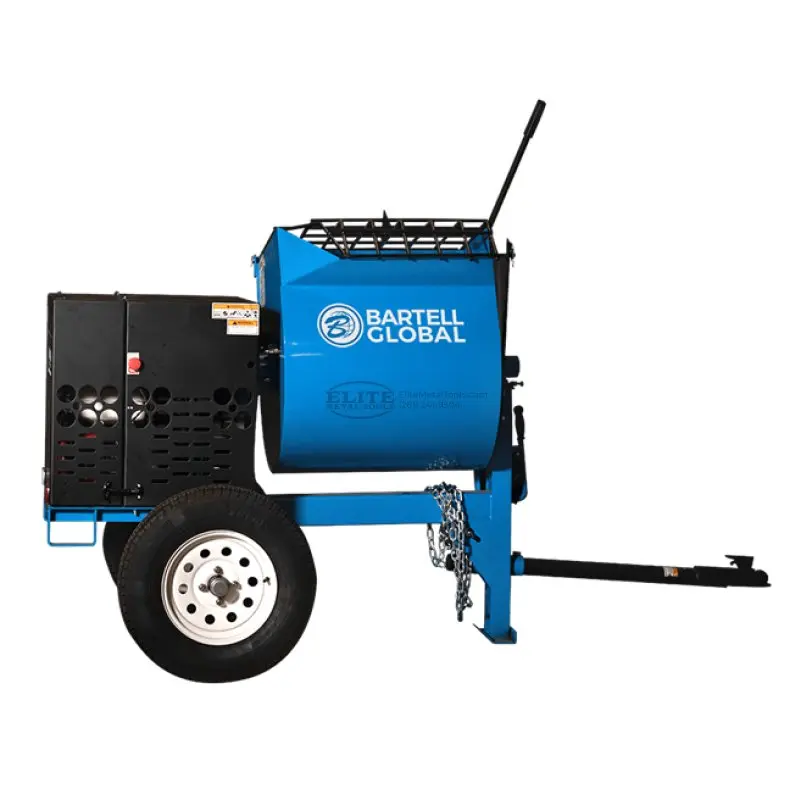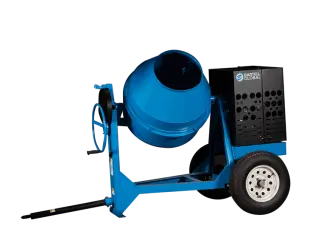Elite Metal Tools Articles
Industry news, tips, and updates on all things Elite Metal Tools
Concrete Mixers - Let's Learn About
The Ultimate Guide to Choosing the Right Construction Mixer: Exploring Types and Considerations
Introduction: Construction mixers are essential tools in the building industry, facilitating the efficient blending of construction materials for a wide range of projects. However, with numerous types of mixers available, selecting the right one can be a daunting task. In this comprehensive guide, we delve into the world of construction mixers, exploring the various types and providing valuable insights on how to choose the perfect mixer for your specific needs. From small-scale DIY projects to large commercial ventures, join us as we navigate the factors to consider and uncover the ideal construction mixer to enhance your construction endeavors. 1. Understanding Different Types of Construction Mixers Portable Concrete Mixers: Versatility and Convenience Portable concrete mixers are compact and easily transportable, making them ideal for small-scale construction projects and remote job sites. Their portability allows for convenient on-site mixing, providing flexibility and efficiency for tasks such as building pathways, patios, or small foundations.
Drum Concrete Mixers: Efficient Mixing for Large Projects Efficient Mixing for Large Projects Drum concrete mixers are known for their high capacity and continuous mixing capabilities. These mixers are well-suited for large-scale construction projects, including building foundations, infrastructure developments, and commercial construction. With their robust design and efficient mixing action, drum mixers ensure consistent and reliable results.
Twin Shaft Concrete Mixers: Precision and High Output Twin shaft concrete mixers offer powerful mixing action and rapid output. They are designed to handle high-demand construction projects such as highways, bridges, and commercial buildings. With their advanced mixing mechanism and precise control systems, twin shaft mixers deliver consistent and homogeneous concrete mixtures.
Vertical Shaft Mixers: Ideal for Precise Mixing Vertical shaft mixers are renowned for their unique design, featuring a vertically-oriented mixing drum. This design allows for precise mixing of materials, making vertical shaft mixers suitable for specialty projects such as precast concrete production and decorative concrete work. These mixers ensure thorough blending and uniform consistency.
Mortar Mixers: Tailored for Masonry Applications Mortar mixers are specifically designed for efficient mixing of mortar and other masonry materials. With their specialized paddle systems, mortar mixers ensure optimal blending, making them ideal for brickwork, stonework, and other masonry projects. These mixers offer excellent control and consistency in mortar preparation./product/17973
2. Factors to Consider When Choosing a Construction Mixer Project Requirements and Scale Assessing the size, scope, and specific material mixing requirements of your project is essential. Consider the volume of material needed and the frequency of mixing. For small-scale projects, a portable mixer might suffice, while larger projects may require a drum or twin shaft mixer for efficient output.
Mixing Capacity and Output The mixing capacity and output of a mixer are crucial factors to consider. Evaluate the desired batch size and the required production rate. Choose a mixer that can handle the volume and demands of your project to ensure smooth workflow and timely completion./product/17974
Power Source Options Construction mixers can be powered by various sources such as electricity, gasoline, or diesel. Consider the availability of power sources at your job site, as well as the environmental impact and regulations. Electric mixers are suitable for indoor projects, while gasoline or diesel-powered mixers offer mobility and flexibility for outdoor or remote sites.
Mobility and Maneuverability Evaluate the mobility and maneuverability requirements for your project. If your construction site requires frequent relocation or has limited access, opt for a mixer with wheels or a towable option. Ensure the mixer can navigate the terrain and fit through doorways or tight spaces if necessary.
Durability and Maintenance Durability is paramount for a construction mixer, especially when working in demanding conditions. Look for mixers made from sturdy materials that can withstand the rigors of construction. Additionally, consider maintenance requirements and accessibility to key components for servicing and repairs.
3. Additional Considerations and Features Mixing Mechanism and Technology Different mixers employ various mixing mechanisms such as paddle, spiral, or planetary systems. Research and understand the advantages and limitations of each mechanism to ensure it aligns with your desired mixing results. Consider advanced mixing technologies that can enhance the efficiency and quality of your mixing process.
Safety Features and Operator Comfort Prioritize safety features in your selection process. Look for mixers equipped with emergency stop buttons, protective guards, and other safety mechanisms to prevent accidents. Operator comfort is also important, so consider mixers with adjustable handles, vibration reduction systems, and ergonomic designs to minimize fatigue during extended use.
Budget and Cost Efficiency Budget considerations play a significant role in selecting a construction mixer. Evaluate the upfront costs, long-term value, and potential rental options. Balance your budget constraints with the desired features and capabilities of the mixer. Remember that investing in a reliable and high-quality mixer can lead to cost savings in the long run.
Conclusion: Choosing the right construction mixer is a crucial decision that can significantly impact the success of your construction projects. By understanding the different types of mixers available and considering key factors such as project requirements, mixing capacity, power source, mobility, and durability, you can make an informed choice. Whether it's a portable concrete mixer for small DIY tasks or a drum mixer for large-scale infrastructure developments, selecting the perfect construction mixer will enhance productivity, efficiency, and the overall quality of your construction endeavors.

